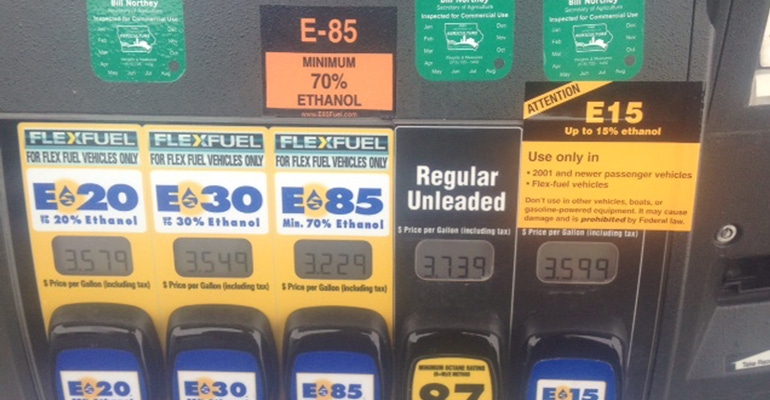
A new state government report shows more than half of Iowa’s fuel retailers carried biodiesel blends in 2016, increasing 6% over 2015. Higher blends are also becoming the norm. Iowa’s proactive state policies have played a crucial role in the growth, helping maintain the state’s position as the No. 1 producer.
The Iowa Department of Revenue released the 2016 Retail Fuel Annual Report in early April. It shows during 2016 the amount of on-road biodiesel blends sold equaled 344.8 million gallons, or 54.7%, of total on-road diesel fuel sales reported. This is up from 308 million gallons, or 48.7% of total on-road (clear) diesel fuel sales the previous year.
Also of significance, the report shows twice as many gallons of 11% to 20% biodiesel (B11-B20 blends) were sold than of lower blends. In addition, 471 on-road retailers now carry biodiesel in Iowa, up from 405 in 2015.
Iowa’s biofuel policies working
“These milestones at the retail level show that Iowa’s progressive biofuels policies are working as intended to increase production and consumption,” says Grant Kimberley, Iowa Biodiesel Board executive director. “This industry is a powerful economic driver, benefiting the rural economy and consumers alike.”
In 2006, the Iowa Legislature passed legislation establishing a goal that 25% of all petroleum used in the formulation of gasoline be replaced by biofuels by 2020. Using the state’s formula, during 2016, biofuels accounted for 12.2% of Iowa retail motor fuel sales.
Kimberley notes there is continued instability at the federal level with the Renewable Fuel Standard, which affects the future of both ethanol and biodiesel. Also, federal tax incentives for biofuels have lapsed, while imports of biodiesel from Argentina and Indonesia continue to undermine U.S. production. Because of illegal trade activities, biodiesel imports from Argentina and Indonesia surged by 464% from 2014 to 2016. That growth has taken 18.3% market share from U.S. biodiesel makers.
State tax credits need to stay in place
“Iowa’s biofuel producers need state tax credits to stay in place now more than ever to remain competitive,” Kimberley says. “The states with the most proactive, comprehensive policies will reap the greatest economic benefits of biofuels.”
In 2016, Iowa’s biodiesel plants produced about 305 million gallons of biodiesel: a record. According to a study by ABF Economics, biodiesel activity generated about 3,800 full-time equivalent jobs. Biodiesel is an advanced biofuel made from agricultural byproducts and coproducts, such as soybean oil. The Iowa Biodiesel Board is a state trade association representing the biodiesel industry.
Iowa has enacted some of the most comprehensive state biodiesel policies in the nation to help make biodiesel more available and affordable for consumers. Those measures include:
• biodiesel retailer’s credit of up to 4.5 cents per gallon for B5
• biodiesel producer incentive of 2 cents per gallon
• 3-cent state fuel tax exemption for biodiesel blends B11 and higher
• infrastructure grants
“Strong state policies encourage production to remain in Iowa, benefiting our economy and Iowa’s biofuels leadership position,” Kimberley says. “Despite the uncertainty of federal policy with the Renewable Fuel Standard, and the trade situation with Argentine and Indonesian biodiesel imports, I still feel the market for biodiesel will continue to grow. Especially if we get these issues resolved in a favorable way for the U.S. biodiesel industry, the opportunities are going to grow even larger.”
Biodiesel industry calls out illegal trading
The National Biodiesel Board and U.S. biodiesel producers in March filed an anti-dumping and countervailing duty petition, making the case that Argentine and Indonesian companies are violating trade laws by flooding the U.S. market with dumped and subsidized biodiesel. The petition was filed with the U.S. Department of Commerce and the U.S. International Trade Commission.
NBB says Argentine and Indonesian producers are dumping their biodiesel in the U.S. by selling at prices that are substantially below their costs of production. The petition also alleges illegal subsidies based on numerous government programs in those countries. This isn’t the first time Argentine and Indonesian biodiesel producers have been charged with violating international trade laws. In 2013, the European Union imposed duties on Argentina and on Indonesia. Just last year, Peru imposed both antidumping and countervailing duties on Argentine biodiesel.
About the Author(s)
You May Also Like




